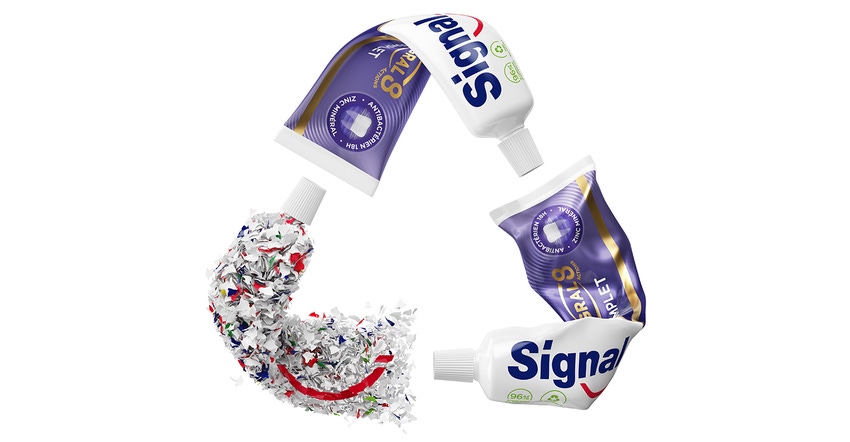Instead of aluminum, the new tubes will use a material made mostly of high-density polyethylene (HDPE), one of the most widely recycled plastics globally.
May 20, 2021

Unilever has developed recyclable toothpaste tubes for its oral-care brands, including Signal, Pepsodent, and Closeup, and plans to convert its entire global toothpaste portfolio to recyclable tubes by 2025.
Traditionally, most toothpaste tubes are made from a combination of plastic and aluminum, which gives the packaging its flexibility but also makes it difficult to recycle. Instead of aluminum, the new tubes will use a material made mostly of high-density polyethylene (HDPE), one of the most widely recycled plastics globally. It will also be the thinnest plastic material available on the toothpaste market at 22 microns, which will reduce the amount of plastic needed for each tube. To encourage wider industry change, the innovation will be made available for other companies to adopt, explained Unilever.
After four years in development, the HDPE recyclable toothpaste tubes will be available later this year in two of Unilever’s biggest oral-care markets — France and India. The first launch will be in France with the company’s leading oral-care brand Signal.
Babu Cherian, R&D, Oral Care Packaging Director, explained to PlasticsToday that the recycling process for these tubes “would largely follow the same process as HDPE bottles. This means that the washing process would happen at the recycling facility, where all the residual toothpaste is washed off.”
The design of the recyclable tube has been approved by RecyClass, which sets the recyclability standard for Europe, as well as laboratories in Asia and North America. Meeting these rigorous requirements means the new tubes can be recycled within standard HDPE recycling streams. Cherian added that the aluminum barrier that made toothpaste tubes unrecyclable was used for “flavor retention and ensuring the quality of the product. Other brands have developed tubes that are recyclable, but these tubes use more plastic than before. We did not want to increase the amount of plastic in the environment, which is why we opted for the thinnest plastic material available on the toothpaste market.”
Samir Singh, Executive Vice President, Global Skin Cleansing and Oral Care for Unilever, said, “I’m proud of this latest packaging innovation, which will see our entire toothpaste portfolio shift to recyclable tubes by 2025. It’s been a long and challenging journey to get to this point, but we hope this transformation will inspire the wider industry also to make the change.”
To drive further change across the waste-management industry, Unilever is working with global recycling organizations to help ensure that the new tubes are collected and recycled, Unilever explained. This will be the case in France, where consumers can put the new tubes in their home recycling bin for collection.
About the Author(s)
You May Also Like




